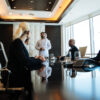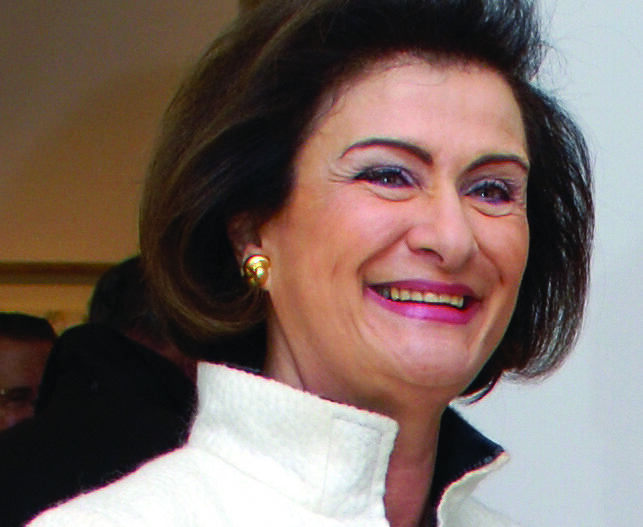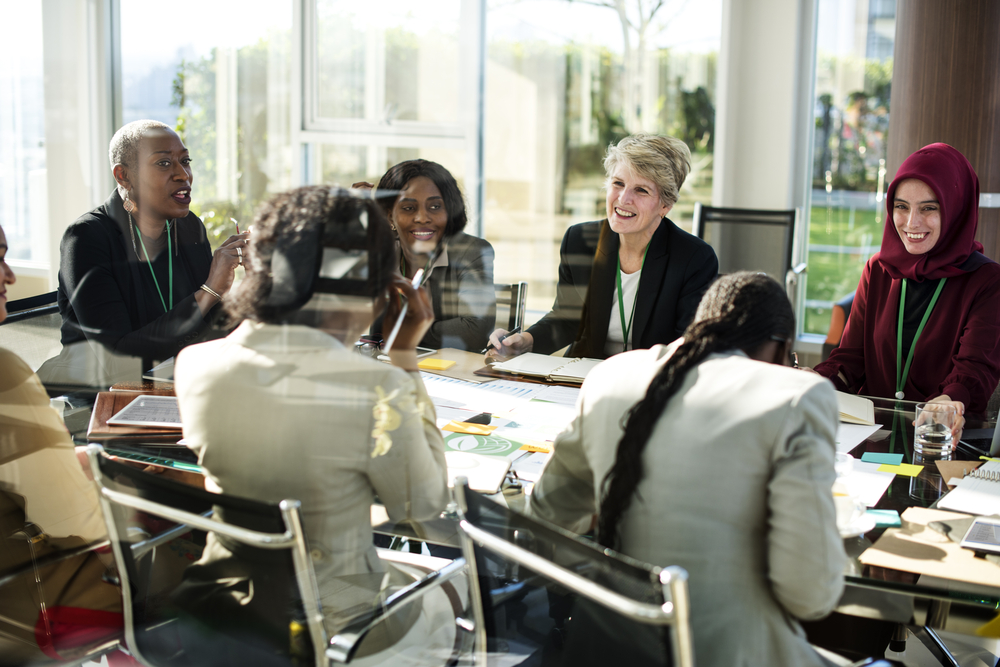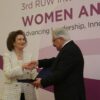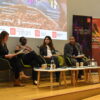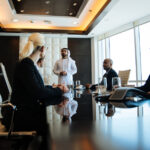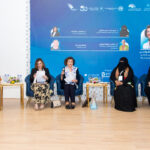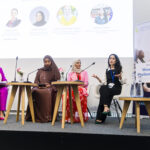On International Women’s Day 2021, AIWF President & Founder Haifa Fahoum Al Kaylani reflects on two decades of leadership of AIWF and her commitment to fostering sustainable development with women and youth at its heart
Each year, I am proud to join the global business, development and NGO communities in celebrating International Women’s Day, and IWD for me is even more special this year because this is the year that we celebrate the 20thAnniversary of the Arab International Women’s Forum (AIWF). As President & Founder of AIWF, I am proud to honour the 2021 IWD theme of ‘Choose to Challenge’, lending my full support to the global call-to-action to challenge gender bias and inequality.This IWD, we reflect on the deep-rooted inequality that impacts women’s lives, homes, and work. It is also important that we acknowledge and celebrate the achievements of women in every sector and sphere; and we pledge to use our platforms and inspire our peers to help create a more inclusive world for women, young people and the most marginalised and vulnerable citizens in all our communities.
I am also proud to recognise UN Women’s key campaign theme for IWD 2021, ‘Women in leadership: Achieving an equal future in a COVID-19 world’, which resonates deeply with me because the achievement of a more equal future post-COVID drove the AIWF 2020 Programme in what was truly an extraordinary year for the international community and for women in particular. As we strive to get back to a ‘better normal’, AIWF joined the call for a future Arab world and global community built on equality, sustainability, and fairness, one that takes a multi-stakeholder, dialogue-based, human-centered approach to addressing the urgent development challenges that still persist in the MENA Region and in all regions, which as we all know have been greatly exacerbated by this unprecedented global public health crisis, which women disproportionately impacted socially, economically and politically.
Gender equality and economic inclusion are key areas for action that have always been immensely important to me, both personally and as the Founder of the Arab International Women’s Forum (AIWF). I launched AIWF in London in 2001 as a non-profit, non-governmental and non-political development organisation for women and young leaders in the MENA and internationally, at what was a very difficult time for the world and for the Arab region in particular. My vision for a much-needed international forum, one that linked Arab business and civil society leaders with each other and importantly with their counterparts in the international community to exchange knowledge, experience and develop their business and cooperation , was built on years of service to a number of voluntary Board roles supporting numerous admirable charitable organisations in the UK and the Arab region, all with a strong focus on empowering women across all sectors and spheres.
At the time that I launched AIWF in 2001, there were many misconceptions about the role of women in the Arab region. I wanted to provide a platform for action where women’s voices could be heard, challenges directly addressed and opportunities for women and young people fully leveraged. AIWF was therefore founded on two guiding principles: firstly, from my firm belief that there can be no development in any community, politically, socially, or economically, without empowering women. And secondly, that the Arab world is part of the global community, and women in the region need to connect both together in the region but importantly with their counterparts internationally to exchange experience and knowledge, to do business, and break stereotypes.
Since 2001 and under my leadership, and working with the full support and collaboration of the AIWF Founding Board members, all outstanding leaders in business, philanthropy, and civil society, contributing on voluntary basis a wealth of expertise to the organisation, AIWF has endeavoured diligently at the heart of the Arab world and internationally to honour these principles, to move the agenda for women’s empowerment forward, to address salient development issues that directly impact economic inclusion for women and young people, to advocate for legislative and public policy change, and to remove roadblocks to women’s participation in Arab political systems and in society overall. We have set a benchmark for a top-down, bottom-up approach in our work, working directly from grassroots to the highest levels of government, and we are unique in our network for our multi-stakeholder approach to effecting change and impacting policy shifts that empower women and young people.
From its earliest days AIWF has prioritised education, sustainability, entrepreneurship, gender parity, job creation, and MENA economic growth, progress and prosperity as our priority areas for action. We have consistently addressed the job creation crisis in a region with the worst youth unemployment rates in the world. We have bridged economic and financial inclusion, societal, digital skills, and gender equality gaps which are prevalent in the MENA region, and many other regions. And we have become a truly global organisation, with a strong Arab, UK, Europe, US and Asian base of longstanding members and institutional alliances.
With the joint vision and leadership of the AIWF Board & Partners, in the last 20 years AIWF has hosted and partnered on key events, initiatives and conferences, held alternately between London, Western European capitals and major business hubs throughout the MENA as well as virtually. AIWF, as an NGO Member of the UN Global Compact, is committed to integrating the SDGs into the programming of all its conferences, initiatives, and activities. Events held since 2001, in London, Berlin, Paris, Dubai, Doha, Damascus, Washington DC, Madrid, Brussels, Sharjah, Cairo, Amman, Beirut, Ramallah, Kuwait City and Fez, have examined strategies for job creation, inclusive sustainable development; the role of women as engines of economic growth; women, peace and security, refugee maternal health and refugee entrepreneurship; women in law and the professions; women-led entrepreneurship, research and innovation; food security, water scarcity, climate action and sustainable energy; and women in healthcare and STEM education. Every one of these initiatives has brought our valued stakeholders together to understand the challenges, identify opportunities, and document a strategic plan for action in our Reports and Recommendations, which are always disseminated widely within our global advocacy network to impact both policy and practice and advance legislative reform, gender parity in policy, and better linkage between industry and education.
From the outset, I have always believed that we can only succeed by working with others. I am very proud to have created numerous successful coalitions of partners throughout AIWF’s history that have included governments, global institutions, leading multinational organisations, the private sector, civil society, universities, and most importantly, women and young people themselves. I have always been exceptionally proud of our partnership with PepsiCo, our valued Global Partner since 2003 and our Exclusive Global Benefactor Partner since 2010. All of us at AIWF remain deeply appreciative to PepsiCo for the continued and valued support and endorsement on all of AIWF’s initiatives in the MENA region and internationally to support women’s economic engagement and active participation in the private sector, in public life, and in sustainability.
I also wish to acknowledge Shell, Pfizer and PwC and Memac Ogilvy, all longstanding Global Partners of AIWF that have empowered AIWF to fulfil its mission in the region on all our areas of shared concern around youth empowerment and economic inclusion of women in the region and globally. We have worked closely with the media to challenge outdated stereotypes of women and inspire narrative change in reporting of women’s successes as well as in representations of women in the media overall. I also wish to acknowledge the excellent partnerships we have had over the years, with leading corporations including Deutsche Bank, Manpower, IBM Middle East, Willis, Boodle Hatfield, Northern Trust, Vistra and many other corporate partners throughout the years with which we have worked to convene, connect and create vital change.
To give one recent example of how AIWF convenes and connects its partners, its people, and its priority areas for action, in February 2021 AIWF brought PepsiCo together with the World Bank for a key webinar collaboration on the role of women in agriculture, examining how digital technologies can accelerate the transformation of the agrifood system, and how efficiency in the design and delivery of agricultural policies can be increased. Also, at the height of the first wave of the pandemic in 2020, AIWF partnered with Pfizer on a virtual panel that spotlighted the immense contributions that women were making on the frontline of the fight against COVID-19.
Over two decades we have also collaborated with the The World Bank, the Union for the Mediterranean, the International Labour Organization, the Center for Mediterranean Integration, the European Commission, the European Parliament, the European Bank for Reconstruction & Development (EBRD), the OECD (MENA-OECD Investment Programme), the Foreign & Commonwealth Office United Kingdom, the League of Arab States, the Union of Arab Chambers, the National US-Arab Chamber of Commerce, the Greater Paris Investment Agency, the City of London Corporation and the Dubai International Financial Center. International and regional institutions have come to AIWF over the last 20 years because they see our ability to bring diverse and high-level stakeholders together, to follow up on action points with our partners, and to inspire corporations, institutions, and governments to do the right thing by Arab women and young people with action and accountability at the heart of our advocacy. Throughout our history AIWF has worked with regional institutional partners, joining forces and linking networks to effect powerful, positive change for women and young leaders, including the Arab British Chamber of Commerce, Hawkamah, the Dubai Business Women Council, the Pearl Initiative, and the NAMA Establishment for the Advancement of Women.
Since our inception, we are also proud to have partnered with some of the world’s leading universities and regional institutes of learning to support opportunities for Arab women in higher education, with a focus on STEM, business and entrepreneurship, including Zayed University; the American University of Sharjah; the American University in Cairo; the American University in Beirut; Birzeit University West Bank Palestine; the School of Oriental and African Studies at London University; Instituto de Empresa Business School Madrid; Imperial College; the Royal Academy of Engineering, the University of Massachusetts Medical School; and Harvard University, where I personally completed the Harvard Advanced Leadership Initiative as a Fellow of the ALI in 2017.
During my transformational year at Harvard, I was able to further my keen interest as a development economist in food-water-energy security challenges for the MENA. One of the key outcomes of my Fellowship was a sustainability enterprise study project I have launched in pilot phase in Jordan as an innovative and scalable solution to key economic, food and water security challenges in the Arab world. The project delivers a model for sustainable agriculture across the MENA region and will introduce modern technology and innovation to the oldest industry in the world, farming, aiming to enhance food security, alleviate poverty, support the rural economy, conserve scarce water resources, and create viable jobs for local communities for men and women, including refugees, as well as – importantly – young people.
Youth engagement has underscored AIWF’s ethos from the beginning and it has been a core principle of my leadership of AIWF. When we launched our Young Arab Women LeadersSTEM-focused initiative in partnership with PwC in 2011, we did so in direct response to the Arab Spring having recognised the need to address the underrepresentation of young people in civic participation and the ongoing crisis of job creation and youth unemployment, and the persistent problem of ‘brain drain’ and economic migration that has cost the region its talented, ambitious, highly educated and driven youth. Through this initiative, over a series of ten linked conferences alternating between the UK and the Arab world, we successfully equipped young women leaders with the skills to start, grow and lead successful businesses; increased access to technical and professional education; and strengthened links between young women in the MENA and the international community to create new business alliances and facilitate the exchange of valuable experiences, opportunities, and best practices. Young Arab Women Leadershas been one of our most successful initiatives to date, as a platform that supports young aspiring Arab women to engage and network with mentors in political, economic and social leadership roles in the Arab world.
AIWF also leads on addressing future of work challenges impacting a complex and changing MENA labour market, where women and youth are still most vulnerable to economic instability and lack of opportunity. The impact of technology, AI and changing workplaces on women and the next generation of the Arab workforce are topics that I care deeply about. In August 2017 I was invited by Guy Ryder, Director of the International Labour Organization, as the only Arab Commissioner to join the ILO Global Commission on the Future of Work (2017-2019). I am personally very proud to have contributed to the January 2019 report of the ILO on the future of work, Work for a brighter future, which outlines the ILO’s human-centered approach and recommendations for mitigating future of work challenges, and to share that in 2019, the AIWF Board committed to supporting the implementation of its ILO Recommendations on the future of work in the MENA region in our programmes and initiatives.
Indeed, one of the key events held as part of the AIWF Webinar Series 2020, a programme of nine high-level virtual events which I was proud to initiate and lead , was on the future of work in the MENA Region and welcomed the participation of the ILO. The series itself launched in July 2020 with an inaugural session welcoming The World Bank, followed by key webinars welcoming Pfizer, the OECD, PwC, the ILO, Union for the Mediterranean, the World Energy Council, Shell, ADNOC, the UN Environment Programme, the EBRD, and other key corporate and institutional partners.
Timely, relevant and impactful topics that AIWF championed in 2020 included The World Bank’s responses to economic challenges aggravated by COVID-19 in the MENA; women on the frontline of the COVID crisis and the work of Pfizer in developing a vaccine; the OECD’s response to the gender impact in the MENA of the pandemic; PwC’s vision for a diverse and inclusive MENA workforce; the Union for the Mediterranean’s outreach and achievements 25 years on from the Barcelona Process; the human dimension of the energy sector and the need to ensure access to sustainable energy for the world’s poorest and most marginalised peoples; fostering the green economy; and the leadership of Saudi women towards the realisation of the Saudi Vision 2030.
I am personally very proud to have initiated and chaired the AIWF Webinar Series 2020 as it was a strong, deeply engaging and highly inclusive programme. With each event welcoming over 200 registered participants from an average of 30 countries, we are proud to have inspired such engagement at such a high level across all sessions. We launched a YouTube channel to archive and make openly accessible the recordings of the webinar series and we are proud that these discussions have been so well received by our partners in the international development, business and research communities in the Arab region and worldwide.
In December, at the end of a remarkable year and as we looked ahead to 2021 and AIWF’s milestone 20thAnniversary year, the Board of AIWF convened virtually to discuss my decision as the original Founder of the AIWF to step down after 20 years as Chairman and during this meeting I proposed Dr Afnan Al Shuaiby, an AIWF Board Member since 2009 and an outstanding young Saudi Arabian woman leader, as my successor. The Board unanimously approved the appointment of Dr Al Shuaiby as the new AIWF Chair effective on 01 January 2021.
I am most proud to have founded the Arab International Women’s Forum and am honoured to have served as Chairman for close to 20 years. I remain a Director of the AIWF holding the title President & Founder. I felt strongly that 2021, being the milestone 20th Anniversary of AIWF, was an appropriate time to hand over the role to a successor who can lead AIWF into the next chapter and the next 20 years of its story. I am delighted that Dr Afnan has agreed to take on the role of Chair, herself very well known within the MENA region as a strong and impactful woman leader.
I am excited about Dr Afnan’s leadership and I and all other Members of the AIWF Board greatly look forward to supporting her in taking AIWF to its next phase of development this year and in all the years of Dr Afnan’s leadership that lie ahead.
Here I wish to reiterate my deepest appreciation and gratitude to both the Founder Board and the current Board for their unwavering dedication over the years to the AIWF mission. It has only been by working together that we have succeeded in building the strong, sustainable, future-focused organisation that AIWF is today. The last two decades have been a remarkable journey of learning and sharing and working with others throughout, a journey that started with a great deal of belief but importantly with the determination to persist and to succeed in making a difference and to effecting positive change . I believe fully in the mission and vision of AIWF, and I have always been driven to accomplish it with the full support and co-operation of our exemplary Board and Partners.
I join the AIWF Board in looking forward to the upcoming AIWF Annual Programme 2021, and indeed to celebrating the milestone AIWF 20th Anniversary this year, during which we will continue to spotlight issues of shared concern as we all shape and navigate the uncertain ‘post-COVID’ years ahead. Personally, and as President & Founder of the Arab International Women’s Forum, I take this opportunity to extend my warmest wishes to all AIWF Partners, Members, friends and the women advocates and grassroots organisations all over the world who are working tirelessly to honour the spirit and mission this International Women’s Day and every day.
Haifa Al Kaylani founded the Arab International Women’s Forum in 2001 and is recognised in Arab and international government, development, business and NGO circles as a high-impact change agent focussed on women’s leadership and youth empowerment, working for progress, inclusion, peace and prosperity in the Arab region and internationally. She is a development economist and an international advocate for gender and youth empowerment, diversity and inclusion, the green economy, and sustainability. She is a Fellow of the Harvard Advanced Leadership Initiative 2017 and was a Commissioner of the ILO Global Commission on the Future of Work (2017-2019). She has spent 36 years in voluntary service and philanthropy, having supported many charities and good causes in the Arab region, the UK and internationally.

